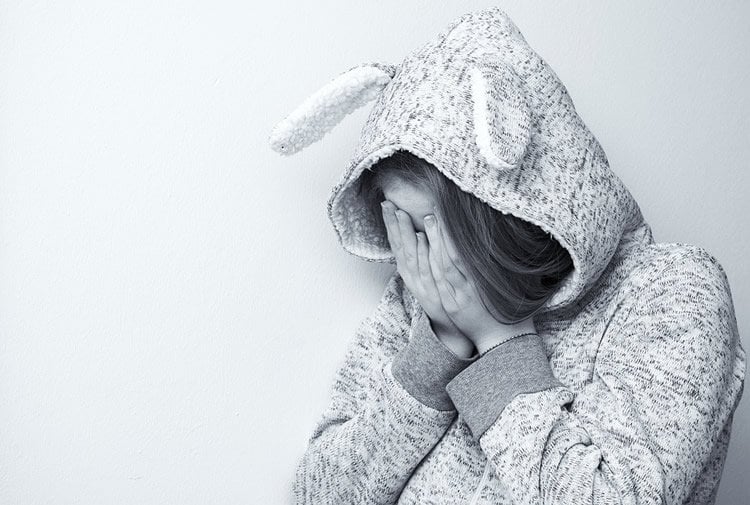Summary: A JAMA Psychiatry study reports the detrimental effect of childhood bullying decreases over time.
Source: UCL.
A new UCL-led study has provided the strongest evidence to date that exposure to bullying causes mental health issues such as anxiety years later.
The study, published today in JAMA Psychiatry and funded by MQ: Transforming Mental Health and the Economic and Social Research Council, found that the detrimental effects of bullying decreased over time, which the authors say shows the potential for resilience in children exposed to bullying.
“Previous studies have shown that bullied children are more likely to suffer mental health issues, but give little evidence of a causal link, as pre-existing vulnerabilities can make children both more likely to be bullied and experience worse mental health outcomes. We used a robust study design to identify causation,” said the study’s lead author, Dr Jean-Baptiste Pingault (UCL Psychology & Language Sciences).
The study involved 11,108 participants from the Twins Early Development Study (TEDS), which is based at King’s College London. By surveying twins, researchers were able to look at the associations between bullying and mental health outcomes, and then account for the confounding effects of their genes and shared environmental influences because they studied both monozygotic (“identical”) twins who have matching genes and home environments and dizygotic (“non-identical”) twins, who don’t share all of their genes, but have matching home environments. Both children and their parents filled out questionnaire: at age 11 and 14 they were asked about peer victimization, and at 11 and 16 they were asked about mental health difficulties.
The effect sizes were stronger before controlling for shared environmental factors and genetics, confirming that bullying itself is only partly to blame for the poor mental health outcomes experienced by bullied children.
The researchers found that, once confounding factors were removed, there remained a causal contribution of exposure to bullying to concurrent anxiety, depression, hyperactivity and impulsivity, inattention, and conduct problems. Two years later, the impact on anxiety persisted. Five years later, there was no longer an effect on any of those outcomes, but 16-year-olds who had been bullied at age 11 remained more likely to have paranoid thoughts or cognitive disorganisation (a tendency for thoughts to become derailed).
“While our findings show that being bullied leads to detrimental mental health outcomes, they also offer a message of hope by highlighting the potential for resilience. Bullying certainly causes suffering, but the impact on mental health decreases over time, so children are able to recover in the medium term,” Dr Pingault said.

“The detrimental effects of bullying show that more needs to be done to help children who are bullied. In addition to interventions aimed at stopping bullying from happening, we should also support children who have been bullied by supporting resilience processes on their path to recovery. Our findings highlight the importance of continuous support to mental health care for children and adolescents” he said.
Dr Sophie Dix, Director of Research at MQ: Transforming Mental Health said: “This important research is further strong evidence of the need to take the mental health impacts of bullying seriously. We hope this study provides fresh impetus to make sure young people at risk – and those currently being bullied – get effective help as soon as possible.”
“More than one in five UK young people say they’ve recently been bullied. And now this unprecedented study gives the strongest evidence to date that bullying can directly cause many common mental health conditions – and have a serious effect on mental health in the long-term. But the good news is that it shows that people can and do get better – demonstrating the importance of resilience. Now we need to understand why this is and develop new ways, through research, to intervene and change lives,” she said.
The first author was an undergraduate student, Timothy Singham, supervised by Dr Pingault and Professor Essi Viding (UCL Psychology & Language Sciences), and they collaborated with other researchers from UCL, King’s College London and Birkbeck, University of London. TEDS is funded by the Medical Research Council.
Source: Chris Lane – UCL
Image Source: NeuroscienceNews.com image is in the public domain.
Original Research: Full open access research for “Concurrent and Longitudinal Contribution of Exposure to Bullying in Childhood to Mental Health: The Role of Vulnerability and Resilience” by Timothy Singham, BSc; Essi Viding, PhD; Tabea Schoeler, PhD; Louise Arseneault, PhD; Angelica Ronald, PhD; Charlotte M. Cecil, PhD; Eamon McCrory, PhD; Frülhing Rijsdijk, PhD; and Jean-Baptiste Pingault, PhD in JAMA Psychiatry. Published online October 4 2017 doi:10.1001/jamapsychiatry.2017.2678
[cbtabs][cbtab title=”MLA”]UCL “Anxiety and Depression Caused by Childhood Bullying Decline Over Time.” NeuroscienceNews. NeuroscienceNews, 4 October 2017.
<https://neurosciencenews.com/depression-childhood-bullying-7663/>.[/cbtab][cbtab title=”APA”]UCL (2017, October 4). Anxiety and Depression Caused by Childhood Bullying Decline Over Time. NeuroscienceNews. Retrieved October 4, 2017 from https://neurosciencenews.com/depression-childhood-bullying-7663/[/cbtab][cbtab title=”Chicago”]UCL “Anxiety and Depression Caused by Childhood Bullying Decline Over Time.” https://neurosciencenews.com/depression-childhood-bullying-7663/ (accessed October 4, 2017).[/cbtab][/cbtabs]
Abstract
Concurrent and Longitudinal Contribution of Exposure to Bullying in Childhood to Mental Health: The Role of Vulnerability and Resilience
Importance Exposure to bullying is associated with poor mental health. However, the degree to which observed associations reflect direct detrimental contributions of exposure to bullying to mental health remains uncertain, as noncausal relationships may arise from genetic and environmental confounding (eg, preexisting vulnerabilities). Determining to what extent exposure to bullying contributes to mental health is an important concern, with implications for primary and secondary interventions.
Objective To characterize the concurrent and longitudinal contribution of exposure to bullying to mental health in childhood and adolescence using a twin differences design to strengthen causal inference.
Design, Setting, and Participants Participants were drawn from the Twins Early Development Study, a population-based cohort recruited from population records of births in England and Wales between January 1, 1994, and December 31, 1996. Data collection took place when the participants were between 11 and 16 years of age from December 1, 2005, to January 31, 2013. Data analysis was conducted from January 1, 2016, to June 20, 2017.
Exposures Participants completed the Multidimensional Peer-Victimization Scale at 11 and 14 years of age.
Main Outcomes and Measures Mental health assessments at 11 and 16 years of age included anxiety, depression, hyperactivity and impulsivity, inattention, conduct problems, and psychotic-like experiences (eg, paranoid thoughts or cognitive disorganization).
Results The 11 108 twins included in the final sample (5894 girls and 5214 boys) were a mean age of 11.3 years at the first assessment and 16.3 years at the last assessment. The most stringent twin differences estimates (monozygotic) were consistent with causal contribution of exposure to bullying at 11 years to concurrent anxiety, depression, hyperactivity and impulsivity, inattention, and conduct problems. Effects decreased over time; that is, substantial concurrent contributions to anxiety (β = 0.27; 95% CI, 0.22-0.33) persisted for 2 years (β = 0.12; 95% CI, 0.04-0.20) but not 5 years. Direct contributions to paranoid thoughts and cognitive disorganization persisted for 5 years.
Conclusions and Relevance This study is the largest to date to characterize the contribution of exposure to bullying in childhood to mental health using a twin differences design and multi-informant, multiscale data. Stringent evidence of the direct detrimental contribution of exposure to bullying in childhood to mental health is provided. Findings also suggest that childhood exposure to bullying may partly be viewed as a symptom of preexisting vulnerabilities. Finally, the dissipation of effects over time for many outcomes highlights the potential for resilience in children who were bullied. In addition to programs that aim to reduce exposure to bullying, interventions may benefit from addressing preexisting vulnerabilities and focus on resilience.
“Concurrent and Longitudinal Contribution of Exposure to Bullying in Childhood to Mental Health: The Role of Vulnerability and Resilience” by Timothy Singham, BSc; Essi Viding, PhD; Tabea Schoeler, PhD; Louise Arseneault, PhD; Angelica Ronald, PhD; Charlotte M. Cecil, PhD; Eamon McCrory, PhD; Frülhing Rijsdijk, PhD; and Jean-Baptiste Pingault, PhD in JAMA Psychiatry. Published online October 4 2017 doi:10.1001/jamapsychiatry.2017.2678






